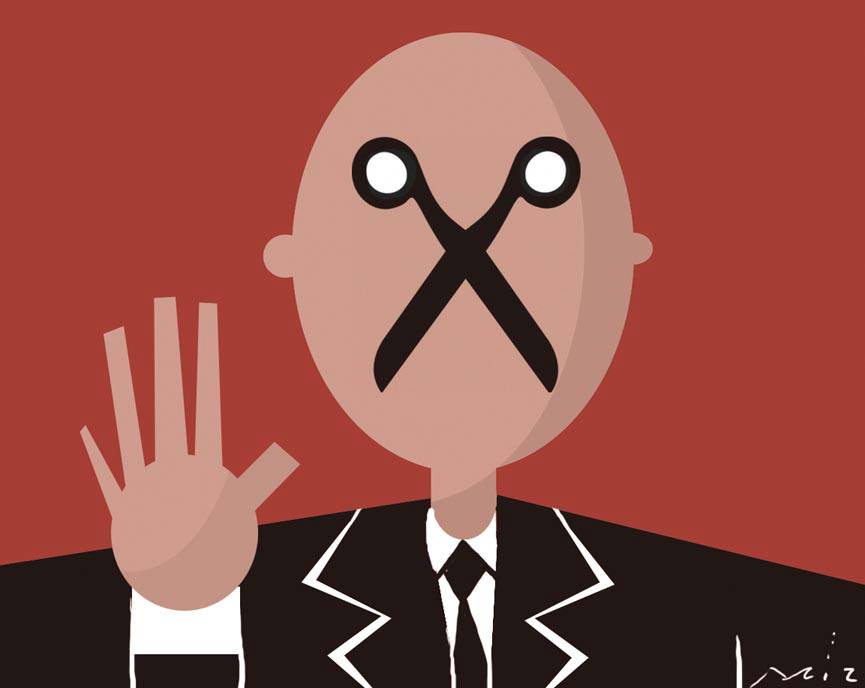Online censorship is latent in Chile
by Digital Rights LAC on April 6, 2015
The latest draft amendments to the Press Law in Chile (known as Digital Media Act) caused quite a bit of controversy over how it would affect the expression of Internet users. The problem is that in a country that has had its fair share of censorship issues on the net, the defense of our freedom of expression becomes an urgent necessity.
By Paz Peña, Derechos Digitales
The latest controversy over freedom of expression online in Chile erupted with the discussion of the so-called “Digital Media Law” – two newsletters (9460-19 and 9461-19) that seek to reform the Press Law (19.733). On one hand we had the creators defending it by appealing to the so called “spirit” of the law, which only intended to regulate traditional online media. On the other, there were organizations, which after the denunciation by Derechos Digitales, noted the potential dangers of a bill that was poorly written, with negative effects towards online freedom of expression.
The big problem with these projects is the vagueness of their concepts, which come along and worsen the already unclear definition of communication mediums in the current Press Law. The latter says:
“Communication mediums are those which are apt for transmitting, disseminating, broadcasting or propagating texts, sounds or images intended for the public, in a stable and regular manner, regardless of the medium or the instrument”.
The idea of the amendment is to define what an electronic communication medium actually is. According to its definition, it means that any publication, whether it is printed or digital, which is published at least four days each week and meets the other requirements of law, will be considered a newspaper.
But if the definition of newspaper, as we see in the press law, is applicable to virtually all websites on the Internet, including social networks, the new distinction of “publishing at least four days a week” does not really help to differentiate an electronic newspaper from other sites that store and distribute content online.
Ignoring the vagueness of this modification is dangerous, because it leaves the door open for it to be used as an excuse for applying all the obligations of an electronic communications medium, which as NIC Chile once pointed out, are rather absurd, to any type of website. This implies fines and, indeed, the obligation of identifying the legal representative of the web, clearly putting the right of anonymity at risk.
Reporting these possible effects on freedom of expression in Chile is not a trivial matter. Often, the public ignores or forgets many cases of censorship on the web that have occurred in the country. Reminding ourselves about them helps us to understand a fundamental fact, that is, the political context in which the Digital Media Act is made possible: the existence of authorities and powerful figures who are willing to clamp down on any critical discourses against them.
Among the most emblematic cases, is that of ElMercurioMiente.cl, a satire website aimed at the traditional conservative newspaper El Mercurio, which lost its domain name after being sued by lawyers of the owner, Agustín Edwards. They argued their case on the grounds of there being an abuse of intellectual property rights. Unfortunately, this is not an isolated case in Chile.
Another case was “Free Rod”, where a twitter user was confronted by the powerful businessman Andrónico Luksic, who personally went to the prosecutors to denounce the satirical Twitter account (@losluksic) as an alleged act of identity theft.
Neither can we forget the case of the current governor of Santiago and former presidential candidate, Claudio Orrego, who sued a satirical twitter user for dubiously stealing his identity, which resulted in punishment for the accused user, in the form of 80 hours of volunteer work.
Bearing in mind these different situations, and looking beyond the future of the Digital Media Law, it is an obligation for both civil societies, as well as the democratically elected authorities, to shut down the possibility of there being any infringements on internet freedom of expression.
Sometimes we forget that censorship is not something that only happens tens of thousands of miles away, as was the case of the bloggers law in Russia which, moreover, also sought to regulate digital media. Unfortunately, it is a sad fact which is a lot closer to home than we care to admit, in a country that prides itself in being one of the most stable nations in Latin America.
Image credit: (CC: BY-NC-SA) Bruno Aziz / Flickr






